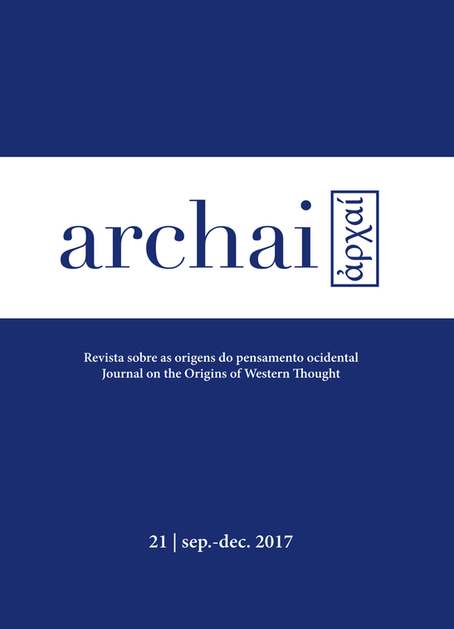La memorización de las epítomes en la comunidad epicúrea y la redefinición de la praxis filosófica
DOI:
https://doi.org/10.14195/1984-249X_21_4Palavras-chave:
Epicureísmo, Epítomes, Prácticas de memorización, RepeticiónResumo
El objetivo del artículo consiste en ofrecer una lectura crítica de una línea de interpretación de la filosofía epicúrea sumamente difundida, la cual supone, en términos generales, que la pedagogía epicúrea descansaba primordialmente sobre prácticas de memorización de las doctrinas contenidas en las epítomes que circulaban al interior de la escuela. Sugeriré, por el contrario, que existen buenas razones para creer que la pedagogía epicúrea se distanciaba en forma sustantiva del panorama sugerido por dicha línea de interpretación, e intentaré mostrar la plausibilidad de una línea de lectura alternativa, la cual relega a un segundo plano las prácticas de memorización y propone reintegrar las epítomes a la dinámica pedagógica propia de la comunidad epicúrea.
Downloads
Referências
ALBERTI, A. (1995). The Epicurean theory of law and justice. En: LAKS, A.; SCHOFIELD, M. (eds.). Justice and Generosity: Studies in Hellenistic Social and Political Philosophy: Proceedings of the Sixth Symposium Hellenisticum. Cambridge, Cambridge University Press, p.161”“190.
ARMSTRONG, D. (2008). “‘Be angry and sin not’”: Philodemus versus the Stoics on natural bites and natural emotions. En: FITZGERALD, J. T. (ed.). Passions and Moral Progress in Greco-Roman Thought. London, Routledge, p.79”“121.
ARMSTRONG, J. M. (1997). Epicurean justice. Phronesis 42, nº 3, p. 324-334.
ASMIS, E. (2001). Basic education in Epicureanism. En: TOO, Y. L. (ed.). Education in Greek and Roman Antiquity. Leiden, Brill, p.209”“239.
BOBZIEN, S. (2006). Moral responsibility and moral development in Epicurus’ philosophy. En:
REIS, B. (ed.). The Virtuous Life in Greek Ethics. Cambridge, Cambridge University Press, p.206”“229.
COOPER, J. M. (2012). Pursuits of Wisdom: Six Ways of Life in Ancient Philosophy from Socrates to Plotinus. Princeton, Princeton University Press.
JUFRESA, M. (1994) (ed.). Epicuro, Obras. Barcelona, Altaya.
ERLER, M. (1996). Philologia medicans. La lettura delle opere di Epicuro nella sua scola. En: GIANNANTONI, G.; GIGANTE, M. (eds.). Epicureismo greco e romano. Atti del Congresso Internazionale, Napoli, 19-26 maggio 1995. Napoli, Bibliopolis, v. 2, p.513”“526.
ERLER, M. (2011). Autodidact and student: on the relationship of authority and autonomy in Epicurus and the Epicurean tradition. En: FISH, J.; SANDERS, K. R. (eds.). Epicurus and the Epicurean Tradition. Cambridge, Cambridge University Press, p.9”“28.
GARCÍA GUAL, C. (2002). Epicuro. Madrid, Alianza Editorial.
________ (2007) (ed.). Diógenes Laercio, Vitae philosophorum] Vidas y opiniones de los filosofos ilustres. Madrid, Alianza.
HANKINSON, R. J. (2013). Lucretius, Epicurus, and the logic of multiple explanations. En: LEHOUX, D.; MORRISON, A. D.; SHARROCK, A. (eds.). Lucretius: Poetry, Philosophy, Science. Oxford, Oxford University Press, p. 69”“98.
HESSLER, J. E. (2011). Proposte sulla data di composizione e il destinatario dell’Epistola a Meneceo. Cronache Ercolanesi, v. 41, p.7”“11.
INDELLI, G.; TSOUNA, V. (1997) (eds.). Filodemo, De electionibus et fugis] On choices and avoidances. Napoli, Bibliopolis.
KERFERD, G. B. (1978). What does the wise man know? En: RIST, J. M. (ed.). The Stoics. Berkeley: University of California Press, p.125”“136.
MITSIS, P. (2007). The institutions of Hellenistic philosophy. En: ERSKINE, A. (ed.). A Companion to the Hellenistic World. Malden: Blackwell, p.464”“476.
NUSSBAUM, M. (1993). Argumentos terapéuticos: Epicuro y Aristóteles. En: SCHOFIELD, M.; STRIKER, G. (eds.). Las normas de la naturaleza. Buenos Aires, Manantial, p.41”“83.
NUSSBAUM, M. (1996). The Therapy of Desire. Theory and Praxis in Hellenistic Ethics. Nueva Jersey, Princeton University Press.
Downloads
Publicado
Como Citar
Edição
Seção
Licença
Dado o acesso público desta revista, os textos são de uso gratuito, com obrigatoriedade de reconhecimento da autoria original e da publicação inicial nesta revista. O conteúdo das publicações é de total e exclusiva responsabilidade dos autores.
1. Os autores autorizam a publicação do artigo na revista.
2. Os autores garantem que a contribuição é original, responsabilizando-se inteiramente por seu conteúdo em caso de eventual impugnação por parte de terceiros.
3. Os autores garantem que a contribuição que não está em processo de avaliação em outras revistas.
4. Os autores mantêm os direitos autorais e concedem à revista o direito de primeira publicação, sendo o trabalho licenciado sob a Creative Commons Attribution License-BY.
5. Os autores têm permissão e são estimulados a publicar e distribuir seu trabalho on-line após a publicação na revista.
6. Os autores dos trabalhos aprovados autorizam a revista a, após a publicação, ceder seu conteúdo para reprodução em indexadores de conteúdo, bibliotecas virtuais e similares.
7. É reservado aos editores o direito de proceder ajustes textuais e de adequação do artigo às normas da publicação.



